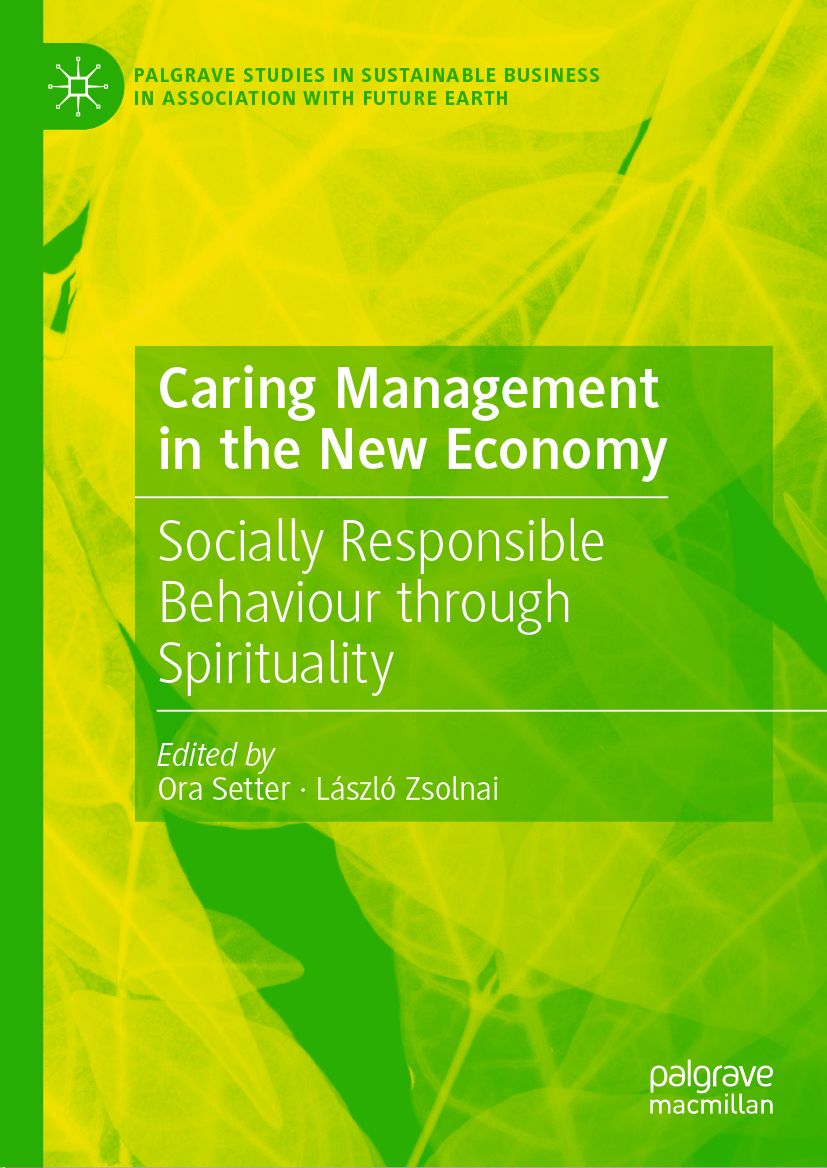
לפני שבוע קיבלתי לידי את עותק הנייר של הספר , שאותו ערכתי יחד עם עמיתי, פרופ' לזלו זולנאי מאוניברסיטת קורווינוס בבודפסט. זהו ספר אקדמי, שיש לו, להערכתי, חשיבות גדולה מאוד. מיותר לתאר כמה אני מתרגשת להחזיק אותו בידי.
המון תודות לשותפי לעריכה, Laszlo Szolnai, על החברות, המקצועיות הקולגיאליות והנדיבות.
שנה וחצי עבדנו על עריכת הספר: פניה אל כותבים שונים, רובם מאלו שהשתתפו בכנס "יזמות אכפתית – כלכלה חדשה, מסורות עתיקות" שנערך בתל אביב בשנת 2017, עריכה אקדמית של המאמרים השונים, כתיבת הקדמה וסיכום, וכמובן הפרק שכתבתי אני עבור הספר, על מטפורת הברית ביחסי עובד – ארגון.
את הספר ניתן לרכוש כאן, בשלמותו, בגרסת נייר או דיגיטלית, או פרקים מתוכו.
מי שרוצה לקרוא את פרק ההקדמה שמתאר את מבנה הספר, וכן את הסיכום, אנא פנו אלי בדואל ora@setter.co.il
הנה תוכן העניינים של הספר:
Table of Contents
Care, and Its Relevance to Today’s Economy. Setter, Ora (et al.). Pages 3-20
Authentic Human Relations and the Economy. Ungvári Zrínyi, Imre Pages 23-46
Caring for Being and Caring for the Other. Bouckaert, Luk Pages 47-61
Getting to the Heart of Compassion in Philosophy and Economic Life. Jackson, Kevin T. Pages 63-81
Consciousness Approach to Management and Economics. Jacobs, Garry. Pages 83-98
New Metrics for a New Economy: The B2T by 2020 Project. Kahane, Yehuda Pages 101-113
Catholic Social Thought and the Economy of Communion as a Business Model. Fernández Fernández, José Luis (et al.) Pages 115-137
Dignity, Love and Servant-Leadership. Héjj, Tibor . Pages 139-162
Social Entrepreneurship, Conscience, and the Common Good. Chalupnicek, Pavel Pages 163-179
The Caring Attitude of Christian and Buddhist Entrepreneurs. Kovacs, Gabor Pages 181-196
Caring Entrepreneurship and Ecological Conscience—The Case of Patagonia Inc.. Ims, Knut J. Pages 197-220
Spirituality and Caring in Organizations: The Covenant Metaphor. Setter, Ora Pages 221-239
Creative Spirit in Management Education: Insights from Rabindranath TagoreMukherjee, SanjoyPages 243-262
Spirituality, Caring Organizations and Corporate Effectiveness: Are Business Schools Developing Such a Path Toward a Better Future? Bettignies, Henri-Claude Pages 263-289
The Significance of Care in Dark Times. Setter, Ora (et al.)
קטע מתוך הפרק הראשון:
Care is an central aspect of human existence. What we care about and who we care for largely determine our way of being. The subjects of care present a frame of reference for our human functioning.
The survival of the fittest, and other Darwinian notions, have become slogans for the business world which favors competitive, instrumental and capitalist values. However, in his Descent of Man, Darwin (1871: 403-404) wrote the following:
Important as the struggle for existence has been and even still is, yet as far as the highest part of our nature is concerned there are other agencies more important. For the moral qualities are advanced either directly or indirectly much more through the efforts of habit, by our reasoning powers, by instruction, by religion, etc., than through natural selection.
David Loye (2009) found that In The Descent of Man Darwin writes 95 times about love…. Of moral sensitivity I found he wrote 92 times….Of competition, he wrote 12 times; of cooperation—called mutual aid in Darwin's time—27 times….For Darwin the prime driver for human evolution—and completion for his theory of evolution….is our capacity for the “moral sense,” i.e. moral sensitivity, an evolutionary inbuilt thrust within us for the development of a sense of right versus wrong.
Care and ethics then, are considered by Darwin as higher level imperatives, and more important than fighting and competition.
Care is essential to our life, and caring is an essential part of who we are.
We need care for our survival. Attachment theory (Bowlby 1982) proposes that all individuals are born with an innate desire to seek proximity to others in times of need or distress in order to enhance their survival prospects. Children as well as other mammalian infants are largely unable to feed or protect themselves as their survival is dependent on their ability to maintain proximity to older, wiser, and more capable adults. The ability of an individual to form an emotional and physical "attachment" to another person – by being taken care of – gives them a sense of stability and the security necessary to take risks, branch out, and grow and develop as a personality. This sense of security (or lack thereof) then becomes the basis of their own individual style of attachment which then remains relatively fixed over the lifespan of the individual. Ainsworth (2015) discovered that attachment formation is an "innate" or instinctive form of human behavior.
Caring for others is also essential part of our humanity. Our brain is wired to react empathetically to the pain of others as a means of signaling danger and eliciting help. Functional MRI scans show that if an individual watches someone an undergo electric shock, their brain lights up in the same areas as those in the brain of the person in pain (Bufalari, Ilaria et al. 2007). When we have feelings of caring or love for other people, we feel better. Moreover, a growing body of evidence shows that providing care can be beneficial to the caregiver, leading to reduced stress, increased happiness, and an increased sense of social connectedness (Inagaki and Orehek 2017).
1 Care in organizations, caring organizations
Within organizational settings, caring is usually thought of as pertaining either to leadership roles or to team and peer social ties. But from the organizational or management point of view, there are more stakeholders to care about.

